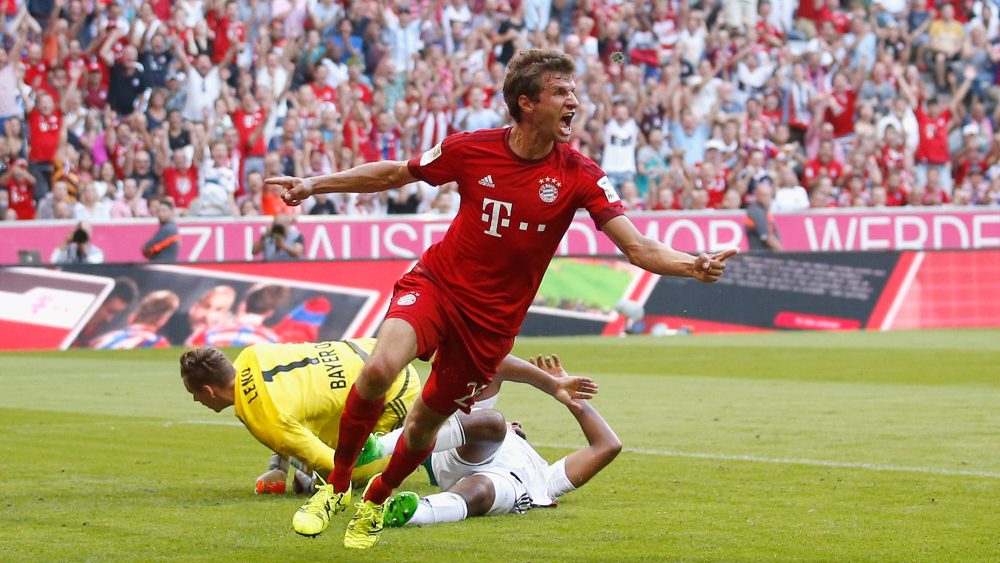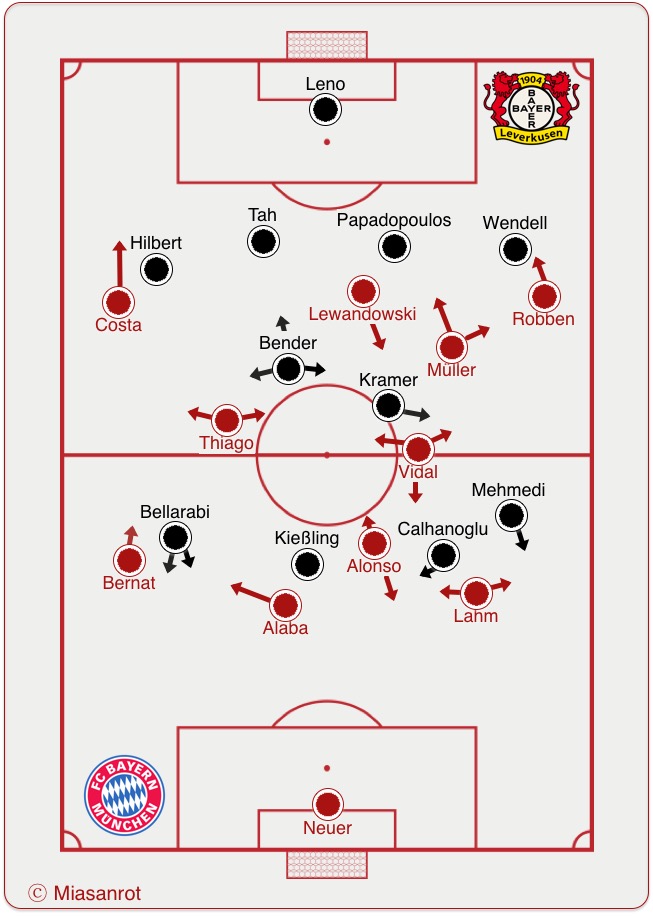Match Analysis: FC Bayern München – Bayer Leverkusen 3-0 (1-0)
In case you missed it:
With Boateng suspended and Benatia injured, Juan Bernat and Thiago got their first appearance in the starting lineup. Leverkusen coach Roger Schmidt fielded the same team as in the Champions League qualifier against Lazio, with new signing Kevin Kampl not yet available.
Three things we noticed:
1. Guardiola’s idea works out
By going for a rather spectacular experimental system, Pep Guardiola took quite some risks against Bayer Leverkusen. It might’ve been the first time in club history that Bayern started a match without an actual centerback. On the pitch, the formation looked like this: together with Alaba as central figure, Bernat and Lahm formed a back-three. Xabi Alonso was positioned right in front of them and regularly moved back to turn it into a back-four, mainly to defend Leverkusen’s long balls and sometimes during buildup.
This constant adjustment required extreme focus from the defenders, as they again and again had to decide whether to contract or disperse. Both Lahm and Alonso especially had to carry the responsibility in this regard. Just how well this worked out is yet another proof of the exceptional football IQ that the two veterans possess. Whenever Alonso moved back, Arturo Vidal immediately covered the vacated area in defensive midfield. It was a spectacular sight.
Guardiola’s plan of relying on such a ball-focused defense worked out wonderfully in the sense that Leverkusen’s pressing, while still uncomfortable to play against, was never an actual threat that could’ve led to goals. Bayern rarely played chaotic long balls and didn’t give up the ball in their own half, aside from Bernat’s minor struggles in the opening phase. They tried to get the ball to the wing as fast as possible in order to create a one-on-one situation for Costa (v Hilbert) or Robben (v Wendell). Whenever that wasn’t possible, it was Alonso’s pendulum-like movement that disturbed the Bayer pressing and allowed Bayern to avoid the early counter pressing. That made the job a lot easier because Leverkusen’s pressing intensity decreased once the first wave had been avoided.
In the air, Bayern didn’t stand a chance. Leverkusen won 24 of the 38 aerial duels, Kießling alone got 8 of those – all in the area between the halfway line and box. However, it appeared to be a calculated risk for Guardiola. The Bavarians always defended the area around Kießling to prevent the headers from reaching his teammates, rendering the aerial dominance useless. Another fact that demonstrates how well-prepared the team was.
Despite this positive performance, Guardiola surely will be glad to have Jerome Boateng back. His tackling abilities are too outstanding and his buildup play too reliable. However, it’s possible that he’s going to be the only centerback more often. Whether it was due to injuries or voluntary, Guardiola has already tried out more ball-focused lineups with Rafinha or Alaba alongside Boateng. This is a serious option, especially in a back-three, that explains why the club has stayed calm despite injuries to Martinez, Badstuber and now Benatia, apparently even allowing Dante to leave now. There are tons of options that are absolutely reliable if played correctly and focused, as this win over Leverkusen proved.
2. Returnees with adjustment issues
For the two Spaniards, it was their first season appearance in the starting lineup. Both Juan Bernat and Thiago needed quite some time to get started. Bernat in particular, the outfield player with the most playing time last season, showed poor timing caused by a lack of match practice. Arriving too late and being booked early on, he improved steadily and fought his way back into the match. It’s certainly a compliment for Bernat that Roger Schmidt sent the ineffective Bellarabi to the left wing at half time so that he could try to get past Lahm instead. The young Spaniard tried hard to avoid mistakes and unnecessary risks and he mostly succeeded. He didn’t add a lot to the offense but underscored that he’s still a reliable option.
After the Hoffenheim match, we named Thiago as one of our biggest worries. Against Leverkusen, he again was not more than a minor character. While he made no big mistakes, he didn’t influence the match much either. This is mostly caused by Bayern’s different playing style that makes the central midfield a lot less important. Thiago played 37 passes, hardly more than Manuel Neuer, with an unimpressive accuracy of 80% and not a lot of creativity. He played one key pass and took two long-range shots, aside from that he didn’t offer much. His presence only became more noticeable after Leverkusen had dropped off. All in all he was more of a side note than a playmaker.
Nevertheless, it’s very important that Guardiola left him on the pitch for 80 minutes so that he could get some valuable match practice. There will be opponents who don’t press as much as Leverkusen do and those are the matches where the central midfield area becomes more important as part of the combination play. Thiago’s skills are needed against opponents who defend deep. Right now a bit of patience is required.
3. The quality of Arturo Vidal
The Chilean needed half an hour to get used to the high pace that was dictated by Leverkusen. Up to that point, he seemed rather impressed and confused by their pressing speed. A few turnovers and lost tackles appeared to motivate him. Between minutes 50 and 75 – the decisive phase of the match – he was the key figure on the pitch. His defensive reach and no-nonsense attitude help the Bayern game a lot. Vidal was involved in 41 (!) tackles, mainly in defensive areas, and won 46% of those.
Even the tackles he doesn’t win are very important for the team, since the opponent is kept busy and exhausted. The wonderfully executed defensive interplay with Alonso wouldn’t have been possible without Vidal – he won the most tackles and covered the second-biggest distance. There was a time in the first half of last season when Xabi Alonso dominated Bayern’s offense. Against Leverkusen, Vidal was the equivalent of that in defense. That he also causes headaches for the opposing defense is a nice addition. Vidal is an absolute key figure in this current phase.
3.1 David Alaba
What a godsend that man is for the club. Alaba did an exceptional job as central defender. Tough tackling, crisp passing – following the 7-1 win over Roma a year ago, this was the 23-year-old’s second masterpiece in an unusual position. Alaba is currently one of the best allrounders in European football. Together with Müller, he is the club’s mid-term future. The club should do all that is possible to keep him signed for a long time. At some point, clubs like Real Madrid and Manchester City will start throwing money at him.
3.2 Thanks, Dante
Just because.













Found this blog only recently. Great content I must say. Keep up the good work!
If you people can get the site featured on Newsnow, it will get the popularity among English readers.
Thank you! We’ll have a look at Newsnow.